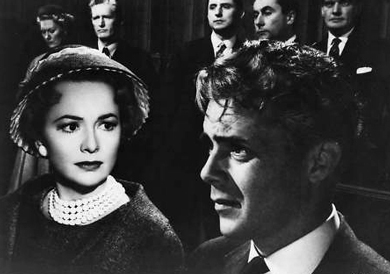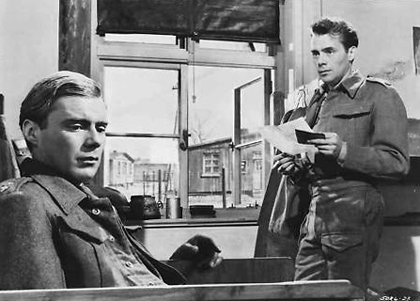
 |
|
|
|
Billy Wilder's 1957 courtroom thriller Witness for the Prosecution was a huge success, and we can't help but think that it influenced the making of this exciting exercise in suspense from Anthony Asquith, one of England's must underrated directors. Libel contains elements of mistaken identity and our old friend amnesia, yet maintains enough credibility to generate a considerable dramatic impact. The story concerns a libel case about events that happened years before, at the end of WW2. Baronet Sir Mark Sebastian Loddon (Dirk Bogarde) spent the war in a German prison camp and escaped in the Spring of 1945. He lost some of his memory during a hospital recovery period, but returned to marry his sweetheart Margaret, an American. Fifteen years later fellow POW Jeffrey Buckingham shows up to claim that Mark is an impostor, that the real Mark is dead and has been replaced by Frank Welney, a prisoner who looked very much like Mark and made it his business to impersonate him. Everybody including Mark is shocked when a trial brings out evidence supporting Jeffrey's assertions -- Mark's hair color, missing fingers, and his seemingly selective memory of events before the war. Lady Margaret refuses to doubt her husband until Jeffrey's lawyer Hubert Foxley (Wilfrid Hyde-White) produces a surprise witness whose existence refutes all of "Mark's" claims. 
Libel pretty much has everything for a courtroom hit -- romance, deception, mental anguish, uncertainty and a seemingly good man hounded by another good man convinced that he is a vile pretender. The story gets underway without fuss, with the Canadian pilot Jeffrey just happening to catch Sir Loddon giving a televised tour of his 16th century estate. Mark Loddon would prefer to forget the whole thing, but Jeffrey forces the story into the London tabloids, and Margaret insists that the family's good name be defended. At first we wonder if Libel is going to be a criticism of the British class system -- American wife Margaret seems more intent on upholding the rights and privileges of her station than Mark is. The court case is packed with the usual twists and turns, starting with the friendly rivalry of the two barristers played by Wilfrid Hyde-White and Robert Morley. Mark begins as a neurotic mess, so it's obvious that he's hiding something, or at least very disturbed by his memory issues. The lack of a really convincing marital bond between the Loddons is also a worry -- they seem more comfortable than in love. It's really rough, arranging flowers and taking long equestrian rides on the endless rolling hills of one's estate. The most interesting material in the film is the relationship between Mark Loddon and Frank Welney, his "double" in the POW camp. We won't go into the issue of strained coincidences here, as they amount to more than just the fact that Jeffrey has a hard time telling his fellow prisoners apart. This of course gives actor Dirk Bogarde a thespic workout, not to mention excellent work by the special effects people. Loddon and Welney are frequently separated by split screens, but the filmmakers manage to fake shadows falling from one side of the screen to the other. For one shot, Bogarde #1 appears to be partially rotoscoped, so he can walk in front of Bogarde #2. The idea that Welney is modeling himself after the high-born Loddon, rehearsing his speech and digging for personal information, makes Libel seem somewhat derivative of Patricia Highsmith's The Talented Mr. Ripley. That theory goes out the window when we discover that Edward Wooll's source stage play was written in 1935, twenty years before the Highsmith novel. In each case an unscrupulous villain is given a rather unlikely opportunity to murder a rich man, assume his identity and take over his pampered life. 
The big question soon becomes, is Mark Mark, or is Mark really that creep Welney? It would seem easy to prove such a thing in any number of objective ways, so Libel deserves applause for generating suspense while keeping us from asking too many questions of our own. Anthony Asquith's direction is assured and direct, always going for the emotional content of a scene. Bogarde puts up such a smokescreen of personal confusion that the story could probably get away with revealing him as Adolf Hitler, escaped from the Berlin bunker. The only weak thing about his performance is his gray hair, which just looks wrong, like one of the purposely bad toupeés he wears as the villain in Modesty Blaise. Olivia de Havilland of course provides stability and sympathy; when Margaret turns against Mark we fear for what our wives may find out about our questionable backgrounds. Paul Massie had a brief run of big parts around 1959 or so: Sapphire, The Two Faces of Dr. Jekyll. He makes a strong and morally determined accuser. Everyone's favorite bounder Anthony Dawson is a Loddon relative who might gain the Baronet-ship (?) should Mark be deposed... we ask ourselves why he's slaving away selling cars while his cousin is living the life of a noble land baron. In a much smaller role is the always-welcome Millicent Martin as a woman who lets Jeffrey use her television set. In for about five seconds is Robert Shaw, as a scandal sheet photographer. Shaw had already been in films and TV for eight years, and I don't know if he was considered a hot prospect or was still struggling. Libel works up to at least three major courtroom revelations that knock the characters and the movie audience for a loop, and for that alone it's a success. I'm suspicious of a couple of dubious coincidences, some extra missing fingers, especially. I'm also a little leery of the ending, when an all-important artifact turns up to support everything Loddon has been saying ... now, don't you think it would have been better if somebody neutral had searched through the lining of that battle jacket? But I in no way endorse Bosley Crowther's ridiculously unforgiving 1959 New York Times review. 
The Warner Archive Collection DVD-R of Libel is a Remastered Edition that looks splendid in enhanced widescreen. Robert Krasker's B&W cinematography is sharp and exacting, giving us a good look at a very successful horror makeup job revealed at the trial. A trailer is included as an extra; the editors cleverly manipulate some of the dialogue to switch things around from the way they are in the movie. Asked in the trailer if she thinks her husband is really her husband, Margaret says, Yes. We mostly know director Anthony Asquith through "quality" productions like Pygmalion, The Importance of Being Earnest and The Browning Version. These are great movies, but my appreciation for him was raised after seeing his silent film A Cottage on Dartmoor, from 1929. Combining the theories of Eisenstein with the visual communication skills of Alfred Hitchcock, Asquith's story of a prisoner on the run is one of the most cinematically creative silents I've seen.
On a scale of Excellent, Good, Fair, and Poor,
Libel rates:
Reviews on the Savant main site have additional credits information and are often updated and annotated with reader input and graphics. Also, don't forget the 2010 Savant Wish List. T'was Ever Thus.
Review Staff | About DVD Talk | Newsletter Subscribe | Join DVD Talk Forum |
| ||||||||||||||||||